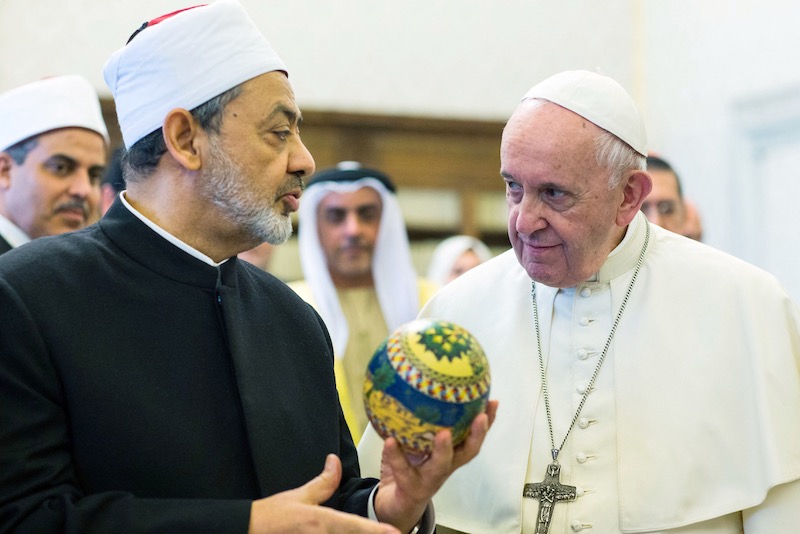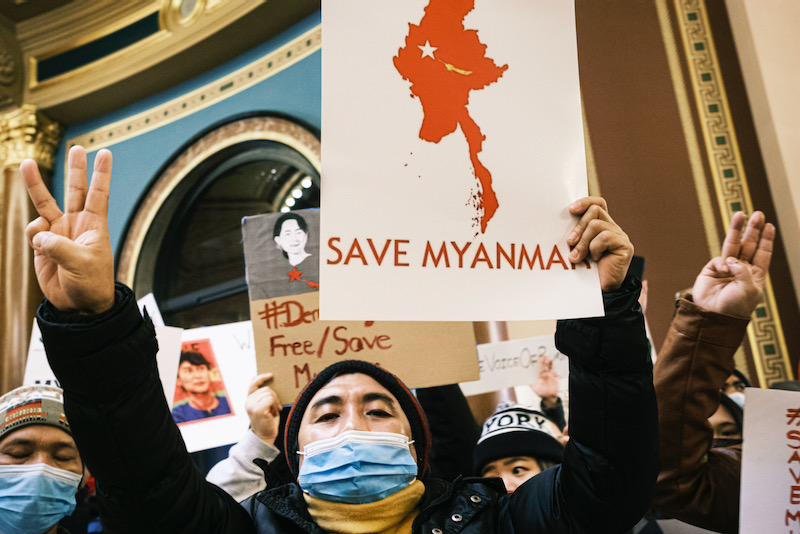Two days after Myanmar’s military coup, the country’s courageous Cardinal Charles Bo issued a truly beautiful and bold statement, with a message for the people of Myanmar, the military, Aung San Suu Kyi and the democracy movement, and the world. It was a message typical of the man who over the past decade or more has been my spiritual mentor, my hero and my friend. It combines a careful balance of courage and wisdom, truth-telling and peace-making, defending democracy and seeking reconciliation.
In his words to the military, Cardinal Bo does not hold back. He expressed the world’s “shock and agony” at the seizure of power by the Commander-in-Chief of the armed forces, General Min Aung Hlaing, undoing a decade of reforms and the peaceful transition to an elected government in 2015. He reminds them of their promises, saying: “You all promised peace and genuine democracy. Democracy was the streak of hope for solving the problems of this once rich country. This time millions voted for democracy. Our people believe in peaceful transfer of power.”
In response to the military’s promise to restore democracy after a year-long state of emergency, the Cardinal speaks for his people when he says: “Myanmar people are tired of empty promises. They will never accept any fake protestation. How will you gain the trust of our people? They will trust only when words are matched by sincere actions.”
The people’s “anguish and disappointment” must be understood, Cardinal Bo warns the generals, urging them to treat people “with great dignity and peace”. He appeals for dialogue and non-violence. “Let there be no violence against our dear people of Myanmar,” he writes.
And in some of the strongest passages of this passionate message, Cardinal Bo calls for the immediate release of everyone who has been arrested. “They are not prisoners of war; they are prisoners of a democratic process,” he writes. “You promise democracy; start with releasing them.”
To Aung San Suu Kyi and the National League for Democracy (NLD) that has led the civilian government for the past five years and won re-election with a massive majority last November, but has now been overthrown by force, Cardinal Bo is equally bold. Praising her sacrifice, he says to her: “You will always be the voice of our people … Truth will prevail,” but in a clear admonition he asserts that the coup came about “due to lack of dialogue and communication and lack of acceptance of one another. Please listen to others.”
To challenge Suu Kyi in this way, while reasserting his support for her and the democracy movement, is almost as bold as his rebuke to the Generals. While Suu Kyi’s star has waned internationally in recent years due to her compromises over the plight of the Rohingyas, she remains as popular as ever among her core base of support in Myanmar and doesn’t take criticism well. But she needs to hear this message, from a friend as loyal as Cardinal Bo, and while our outrage at her ousting and arrest must be unambiguous and clear, she would do well to reflect on lessons learned.
In his message to the international community, Cardinal Bo says the world’s attention and concern “matters a lot”. Where I, very reluctantly, partially differ from him is in his assertion that “sanctions and condemnations … closed doors and shut out dialogue”. He warns that “sanctions risk collapsing the economy, throwing millions into poverty. Engaging the actors in reconciliation is the only path”.
Let me unpick this and set out where I agree first. In reminding us that “the international community needs to deal with the reality, understanding well Myanmar’s history and political economy,” Cardinal Bo is absolutely right. Broad-based sanctions against the country and the people definitely would be entirely the wrong path to follow. No one I know is calling for such sanctions, and certainly I strongly oppose them. The last thing we should be doing now is any action that could harm the people of Myanmar who are already faced with such challenges.
At the same time, to allow the overthrow of a democratically-elected government, the arrest of elected ministers, Members of Parliament and of peaceful civil society activists to go unchallenged would send entirely the wrong message, to the regime in Myanmar and to the rest of the world. To say that such an assault on democracy can occur with impunity, without consequence, would be to allow Min Aung Hlaing and the army to get away with what they have done and to send a green light to every other tyrant in the world considering similar action.
So I believe there should be very carefully targeted punitive measures against the military and its enterprises. We have to raise the cost of what they have done, so that they begin to think it was not worth it. To bring them to the dialogue table, we must make life uncomfortable for them – but them alone.
But where, once again, Cardinal Bo and I are totally united is in pursuit of reconciliation. Any international condemnation and sanctions should not be an end in themselves, but with the goal of restoring democracy and dialogue in Myanmar. And I passionately agree with him when he says: “Peace is possible. Peace is the only way. Democracy is the only light to that path.”
And in his message to the peoples of Myanmar, Cardinal Bo is clear in his solidarity and his appeal for prayer. Today, the Church throughout the country will be fasting and praying, and I hope Catholics throughout the world will join too. “Pray for all, pray for everything,” says Cardinal Bo. “Let us not continue hatred at this moment when we struggle for dignity and truth.”
This is a message from a giant of the faith, whose wisdom and courage is worn lightly, with humility and humour, but which I have seen close-up for many years and see again at this time of crisis for his country. I was inspired and received into the Church in Myanmar by Cardinal Bo eight years ago, and it was precisely this mix of boldness, thoughtfulness, graciousness, honesty, humility, love and a deep passion for peace and reconciliation based on truth and justice that I saw in him that drew me into the Church. A commitment to the Church’s three teachings that go in tandem: truth-telling, justice-seeking and peace-making. The world, the Generals, Daw Suu and the peoples of Myanmar would do well to study his message carefully, reflect on it, pray for him and work with him to help Myanmar onto a better path.
Benedict Rogers is a human rights activist and writer, specializing in Asia. He is Senior Analyst at the international human rights organisation CSW and author of three books on Myanmar, including “Burma: A Nation at the Crossroads”, and a book about his spiritual story, “From Burma to Rome: A Journey into the Catholic Church” (Preface by Cardinal Bo).



 Loading ...
Loading ...
What do you think?
You can post as a subscriber user ...
User comments (0)